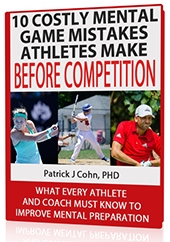
Embracing Sports Psychology
All athletes have coaches or trainers that physically prepare them for competition. Athletes spend a tremendous amount of hours honing their technique, working on game plans and competition strategy and physical conditioning in hopes of achieving success. Elite athletes recognize that, in terms of physical ability, the playing field is relatively even.
Talent and hard work can only take you so far in athletics. That’s why many athletes seek to find advantages through other means, such as nutrition or recovery techniques. But the one component that provides the greatest advantage and return for your effort is mental training. Not only does mental training positively affect your mindset for competition, but it enhances your practice and training effort by improving focus, level of effort, confidence and speeds learning.
However, some athletes still don’t understand the value of mental training or working with a sports psychology coach. They even think that mental training is a sign of weakness—if you have to get help from a mental game expert. They worry how others will perceive this. So these athletes avoid working with a mental coach or sports psychologist.
Romain Grosjean, 27, is a Formula 1 racecar driver currently driving for the Lotus F1 Team. Grosjean has successfully competed in Formula and Open-Wheeled Series racing since 2003. In 2012, Grosjean made his comeback to Formula One racing and collected three Formula One podiums (top three places) finishing the year in 8th place.
In his first 12 Formula One races in 2013, Grosjean had only two podium finishes. Grosjean then hired a sport psychologist to help with the mental aspects of racing. He understood that working on his mental game is not a sign of weakness, but rather a way to improve his performance on the track.
“I think I started because I was clever enough to think I needed help. It’s not a proof of weakness, it is more a strong point because you can always improve yourself and that is why I work with a sports psychologist now.“
As a result of working on his mental game, Grosjean took four podiums in the final six races of the season and ended the season in 7th place. Grosjean credited working with a sports psychologist as one of the keys to his strong finish in 2013.
Grosjean discussed insights learned from his weekly sessions with his sports psychologist and how his improved mindset and patience helped his mental approach to racing:
“Sometimes I’ve wanted to dance quicker than the music. Like in Monaco this year and I messed up the weekend because I wanted to go too fast for where we were. It’s about being in the right time, doing the right things, managing the pressure and the stress, when it comes up, and knowing why and how. Seeing how people are reacting around you helps you understand the pace yourself. It’s also about being ready to be a No. 1 and a world champion, which is not that easy at the end of the day.”
If mental training greatly increases a racecar driver’s chance for success, why do athletes hesitate or avoid working with sport psychologists? Many athletes still believe that asking for “help” is an admission of weakness. That something must be wrong with them if they have to work on their mental game.
The philosophy of all coaches is to take their athlete from where they are to reaching their goals. Sport psychologists or peak performance coaches have the same objectives.
A mental game coach or sports psychologist provides practical insight and proven techniques to better help an athlete succeed.
The melding of physical and mental training comes together to help racers perform at their highest level during races. Mental game coaching is not for weak athletes. Rather mental game coaching is to help you improve yourself and thus your performance.
If you want more information about mental training programs or products to improve your mental game, please visit Peak Performance Sports’ sports psychology coaching programs.
Related Sports Psychology Articles:
- The Psychology of Sports Injury
- How to Introduce Sports Psychology to Athletes
- Case Studies In Sports Psychology
Free Mental Toughness Reports

Get instant access to a mental game report to improve your mental toughness. Are you making one or more of these “deadly” mental game mistakes prior to competition? You can improve your mental game with one of our free sports-specific reports below.
with our free mental toughness reports, you’ll:
- Discover if you have positive or negative pregame jitters.
- Identify your pre-competition mental game mistakes.
- Learn the important pregame mental skills to boost your performance and success!
Learn how mental game strategies can boost your mental toughness in sports with Dr. Cohn’s free mental game reports!
